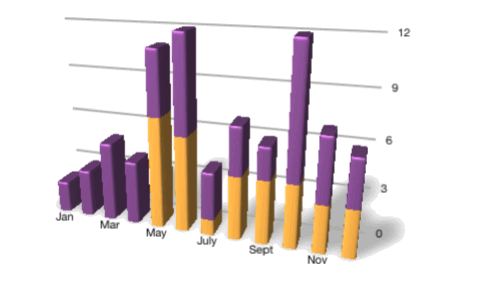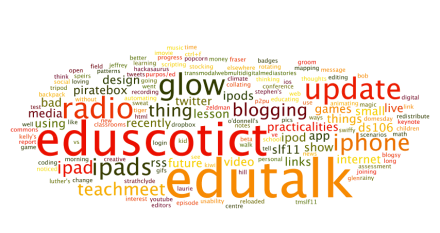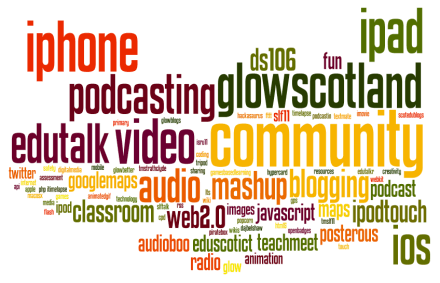Royal Borough of Kensington and Chelsea, Greater London, England
This audio file was orginally posted to AudioBoo(m) with the mobile app. It has been downloaded and posted here since audioboom no longer supports free accounts.

Royal Borough of Kensington and Chelsea, Greater London, England
This audio file was orginally posted to AudioBoo(m) with the mobile app. It has been downloaded and posted here since audioboom no longer supports free accounts.
London, Royal Borough of Kensington and Chelsea, United Kingdom
This audio file was orginally posted to AudioBoo(m) with the mobile app. It has been downloaded and posted here since audioboom no longer supports free accounts.
As usual at this time of year I’ve been looking back over the posts. In the past I’ve tried to summarise a few, but this year I though I’d take a different view.

In May I started posting interesting finds via one of my posterous blogs, these are shown in yellow. My posting to my main posterous blog (archive.org) has decreased this year and turned into a stream of iphone photo walks, but I’ve been posting a lot more to enviable stuff (archive.org) which in turn gets auto posted here, these posts haven’t garnered many comments but they get the odd retweet and as I enjoy posting them I am assuming they are worth doing![]()
Comments are down I think, this has never been a blog with lots of comments but except for the odd post not much discussion has taken place this year. I don’t really write for comments, a lot of posts here probably drop between stools (eg code to weird for educators and to poor quality for developers) and have a very small interest group

Putting eduscotict and glow together would probably make my two main interests in the year glow(and its development) and edutalk. I was interested to see that update stands out.

The tags point to a obsession with iOS devices this year. I’d bet most of the video tag will be on iphone posts.
The stand out tag is community which reflect the stand out tile words, eduscotict and edutalk. The second biggest tag in this blogs history, classroom is dropping back as is my most frequent tag blogging.
ds106 is starting to rear its head, I expect it will grow as I learn next year joining in the digital story telling class.
I hope eduscotict will be growing a bit next session as glow develops into its next stage, I hope too that my posts about glow can move from critical friend to fan![]()
I though with the previous post I’d finished blogging for the year, but this is too good to keep.
This morning firing off the EDUtalk bot brought in a couple of new podcast episodes one from iPadio and one from AudioBoo.
I is always interesting seeing what comes in to an open invite and the flow of posts on EDUtalk comes and goes, some times a trickle and occasionally a flood, I didn’t expect much over the holiday period.
The two posts today are both interesting and exciting in themselves and as an indication of a couple of recent branches that have developed on EDUtalk.
One Hack Rap by Alan O’Donohoe (teknoteacher) is a rap boo to attract pupils to computing, Alan has a great series of boos about introducing programming to pupils. His mission to TEACH COMPUTING not secretarial skills. Alan is Co-founder of the very exciting Hack To The Future. This hacking theme has been popping up fairly frequently on EDUtalk,for example Talking #Hackasaurus with @iamjessklein at #HiveLondon #MozFest by Doug Belshaw and a lot of Leon Cych‘s edutalk input. Leon has been one of the major EDUtalk contributors and posting a ton of fascinating eduhacking stuff there and on the Learn 4 Life site (where Hacking, mentoring and rapid prototyping as new models for learning is one of my favourites).
MAT4ESL iDeaCast 04 by Scottlo this is Scottlo‘s second contribution to EDUtalk. The phlog has bee echoing round my brain all morning lots of exciting ideas for all sort of things. The Scottlo Radio Blog comes from Japan, Scott is a contributor to DS196 and involved in ds106 Radio which of course provided inspiration and instruction for Radio Edutalk. David and I have been starting to plan with Scott about possible collaboration between Radio EDUtalk and ds106 Radio.
As I blogged a couple of posts ago, I am going to try joining in with ds106 after the new year, it looks like leading to some very interesting places.
Both of these posts link nicely, in my mind, both linked deeply to ideas of hacking education both philosophically and practically. Hack To The Future has the same spirit as the mashup culture of ds106. I really hope we can get most of this in 2012.
I’ve deliberately not embedded the audio here but I hope lots of folk go to EDUtalk and have a listen.
Since the last post (Show notes without a Show Radio Edutalk episode 2.5) we have taken a few more baby steps over at Radio Edutalk.
A week ago, I attempted a chat with Iain Hallahan over Skype. I basically started up Nicecast, and hyjacked the Skype audio. I’ve now figure out that if I just hyjack the one channel I don’t get the echo problem we had earlier. Settings Screenshot.
Iain talked about TeachMeet Beyond and kicking off TeachMeet 365. I think the chat went really well due to his enthusiasm about some facination projects, the audio is archived as an episode of Edutalk: Iain Hallahan on Radio Edutalk
Last night David and I tried a variation where we invited folk on twitter to come in over skype for a chat. Stephen Reid and Joe Dale kindly obliged talking about podcasting. We had a bit of bother getting them into a conference call via the dial in, but David pulled them in via their skype accounts. Stephen was on the move and joined in via 3g on his iPhone keeping our EDUtalk strapline, Audio publishing by educators, using mobile devices accurate. Again the audio is archived: Radio Edutalk 24 November 2011.
After we finished Joe gave us a wee hand sorting out the dial in stuff, in the future people will be able to dial in using any phone to 0131 208 1084.
So we seem to be getting a workflow together. Last night it worked well with David figuring out the skype bit and myself the nicecast end. Due to space at home I was using my mackbook in my daughter’s bedroom rather than hooked up to the monitor in the living room, keeping Skype, it’s chat window, twitter and nicecast organised was a wee bit tricky. The week before having the living room and larger monitor made it a wee bit easier.
I am also beginning to understand some of the difficulties in handling live multi voice conversations. An increasing number of podcasts I’ve been listening to have had more than one presenter or voice. This makes, for me, interesting listening, but there is a bit of a learning curve, which I’ve just stared on, in doing this smoothly.
The audo quality seems to be pretty good, I am using a cheap usb mic, but hope to get a better one sometime soon.
So far we having been using Nicecast, but I’ve also downloaded a free application LadioCast which might do the same job, I need to do some tests and see if it can archive.
The rest of the week Radio Edutalk has been streaming random items for the Edutalk archive. I had also set up several Scheduled playlist, to play at 7:30 in the evening, unfortunately I’ve been away for a few days and didn’t tweet these out as I’d planned. I hope to try the same again over the next week and also try djing audio for he archive giving folk a chance to phone in at some point.
I’ve taken out a 500mb AutoDJ disk which hold the archive, it is already filled up. I don’t really want to pay for a bigger disk, a monthly charge, so the choice is some manual shuffling via ftp or perhaps changing bit rate from 128 to 64. The later would involve converting all of the files and getting the internet radio folk to change the settings for the stream. I am not sure how much the change would effect the quality?
As yet we have not had a lot of listeners, but I’ve found myself listening in to the random stream more often that I thought, it makes interesting listening and can spark off all sorts of ideas.
I’ve been collecting various internet links using linkli.st internet radio · linkli.st a failry new service that makes creating list of links very simple. I love the way you can create bookmarklets for any of your links screenshot.
I also use Storify to curate some tweets for last nights broadcast to include with the show notes: Radio Edutalk 20111124 · johnjohnston · Storify, Storify is easy to use and looks useful.
David and I will be talking at around 8 o’clock and the lines will be open, if you are online have a listen and if you like dial in (0131 208 1084) to put in your tuppence worth. Given the date I presume we will be talking strike along with some general eduTalk and edTechTalk.
Radio Edutalk has been up and running for a week or so now. We had our first attempt at a live skype last Wednesday (archive). This was not hitch free as I messed up the settings making my audio echo, David on the other end of the Skype call and an iTunes track or two seemed fine. I think I know how to fix it.
The listener numbers have ben low with 45 unique listeners. We peeked at 6 at once. This is fine, it might build up a wee bit over time. As I mentioned in the previous radio post, it is not about numbers. The low numbers will also make it easier to keep the radio turning over 24 hours a day. The current plan is:
Hopefully you might find something of interest if you dip in to the stream in, perhaps as you do some marking or prep.
Edutalk has now been running for over 2 years, we have published over 300 pieces of educational audio. These vary from TeachMeet recording, through to personal reflection by way of pupil podcasts. Hopefully theses provide interesting and educational listens.
One of the things that David and I talked about when we started EDUtalk was issuing a CD rom of recordings, this would perhaps have helped to keep older, still valuable, audio playing.
One of my thoughts about podcasts is that older episodes get forgotten about in a way that old blogs posts, through searching, do not.
REcently I’ve been reading about and listening to ds106 Radio and Stephen’s Downes’ Ed Radio. These are Internet radio stations. My interest was also stimulated by my daughter who is currently doing some pro bono work for Airing Pain « Pain Concern a podcast and internet radio.
I’ve alway believed (and gone on about) one of the benefits of podcasting over radio is its asynchronously. The potential audience for internet radio would seem to be less. A few things have made me think again:
A comment on Stephen Downes – Google+ about ED Radio:
That's the intent of Ed Radio, it's not something you really focus on, it's more background where you listen while you work & where something may or may not catch your attention.
Somewhere else, Stephen wrote about the interesting challenge of broadcasting to no listeners. Can’t find the quote at the moment.
on broadcasting to radio #ds106 | D’Arcy Norman dot net
How does the ability to instantly broadcast live audio to a group of people impact what we do? How does this instant synchronous connection effect the sense of social presence? And how does having to make the decision of streaming vs. recording effect the experience of sharing?
I’ve also been impressed by the quality of internet radio when streaming to a phone on g3 as well as wifi. So we though we would give this a go
There are various posts on the how to set up a station but I basically went to Internet Radio Servers and set up an Icecast server on pay as you go. I then followed CogDog Guide to Nicecasting – CogDogBlog to test Nicecast. You can use Nicecast to broadcast from iTunes or a mix of iTunes and voice or even iTunes, voice and Skype. You can use Nicecast for an hour at a time for free and pay when you have tested it. I am using it on test mode at the moment. I have also tested the AutoDJ set up, where the station just streams from a set of mp3 you have uploaded via ftp. this seems to works well. Instructions on Internet Radio Servers are straightforward.
I’ve briefly tested Papaya Broadcaster a £2.99 iPhone & iPad app this seem to do the trick. allowing you to broadcast on the move.
The costs at the moment £5 a month to host the AutoDJ files and £5 per 10GB broadcast. I am figuring with only a few listeners it will only be £10 a month to broadcast for an hour or so each night, using a variety of sources.
We have a few loose ideas of what to broadcast:
It seems that you need to use files that all have the same sample rate, bitrate and number of channels. I’ve started off with 60-70 files downloaded from Edutalk , the problem is these do not all have the same sample rate, bitrate and number of channels This can be dome by opening and exporting the files from Audacity, or exporting them from iTunes. This could take quite a while. A quick google found a script for the Lame lib (That is used by Audacity to export mp3s), You need to instal Lame so that it is available for command line use, this sort of stuff can be daunting but worth it as a time saver.
What I did was open the Terminal, navigate to the folder full of mp3s (on a mac you can type cd and then drag a folder onto the terminal window), then you just put this int othe terminal window and hit return:
mkdir save && for f in *.mp3; do lame -m m -b 128 –resample 44.1 "$f" ./save/"${f%.mp3}.mp3"; done
What that does is make a new folder save inside the mp3 folder, then use lame to convert all the mp3s in the folder into new files in the save folder that all have a bitrate of 128, a sample rate of 44.12 and are mono files. Well worth doing if only to avoid having to see asave dialog 60 times.
between 7:30 and 8:30 head over to Radio Edutalk – EDUtalk. A flash player should start when the page opens. There are also buttons to listen with winamp, Windows Media player, Real player or QuickTime. Hit the title song to open in iTunes.
I’d love to hear what folk think, ideas for broadcasts or cc licensed audio that could be played.
Glasgow, Glasgow City, Scotland
This audio file was orginally posted to AudioBoo(m) with the mobile app. It has been downloaded and posted here since audioboom no longer supports free accounts.
Glasgow, Glasgow City, Scotland
This audio file was orginally posted to AudioBoo(m) with the mobile app. It has been downloaded and posted here since audioboom no longer supports free accounts.
Glasgow, Glasgow City, Scotland
This audio file was orginally posted to AudioBoo(m) with the mobile app. It has been downloaded and posted here since audioboom no longer supports free accounts.